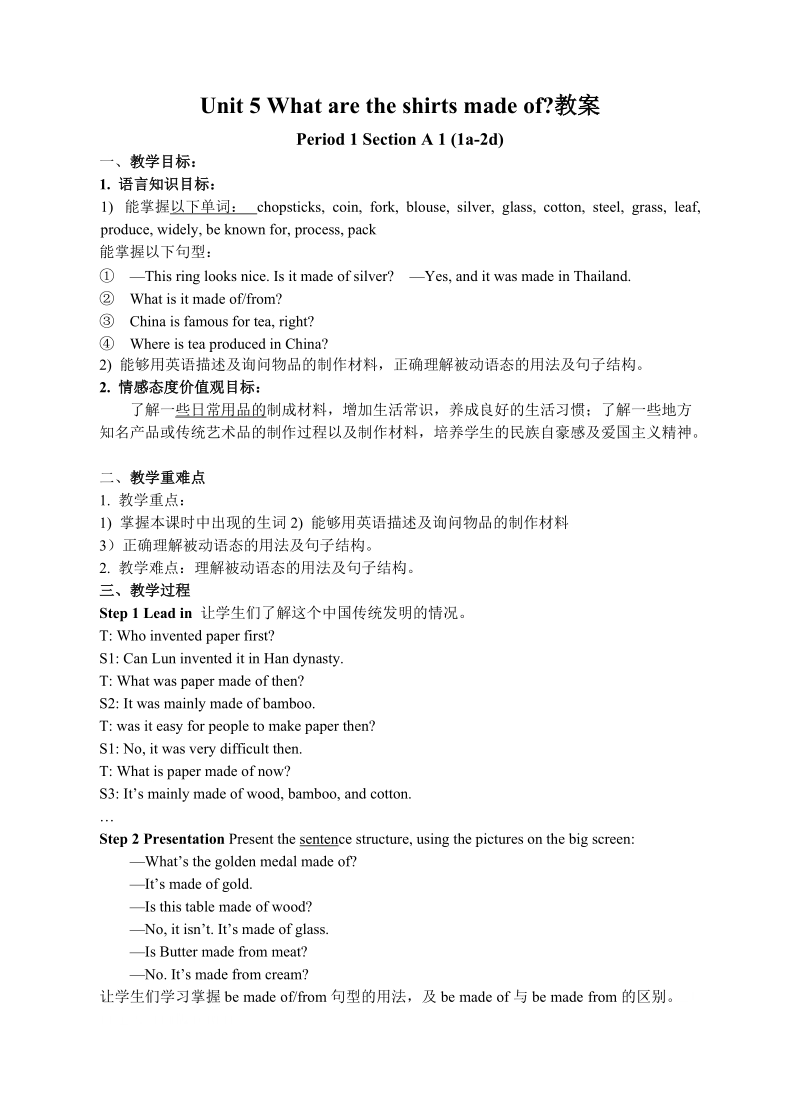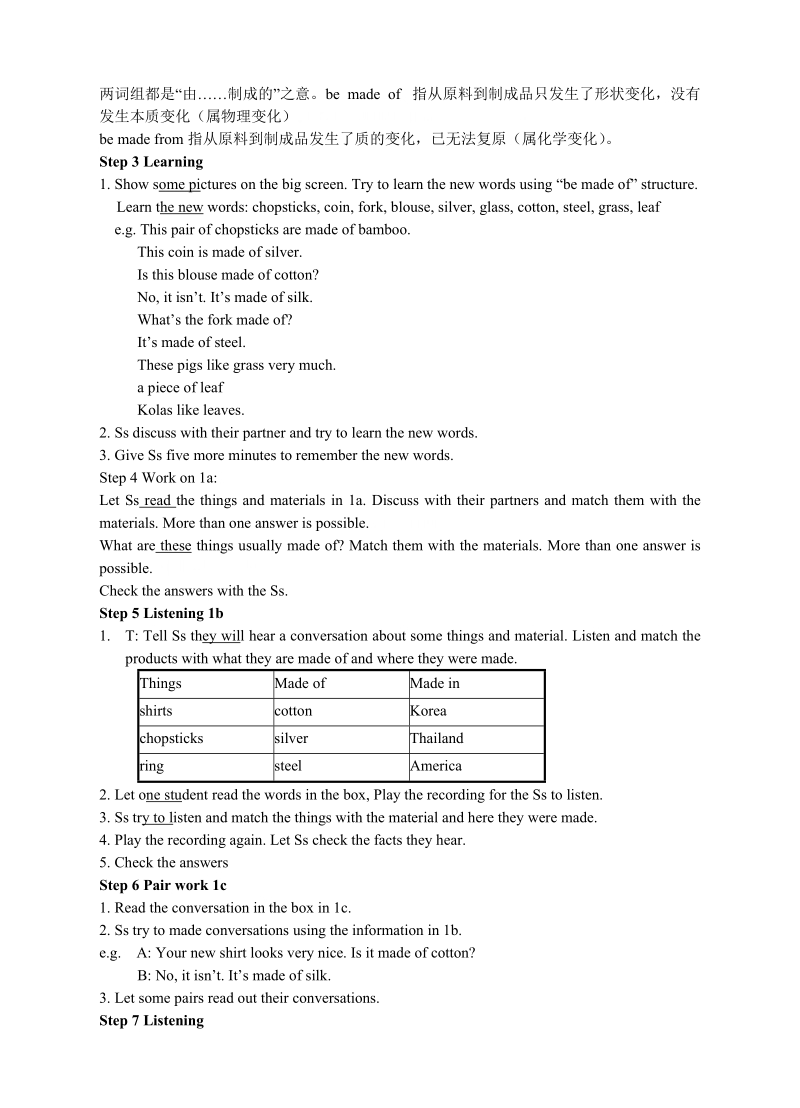 人教版新目标九年级英语Unit5 全单元教案
人教版新目标九年级英语Unit5 全单元教案
《人教版新目标九年级英语Unit5 全单元教案》由会员分享,可在线阅读,更多相关《人教版新目标九年级英语Unit5 全单元教案(19页珍藏版)》请在七七文库上搜索。
1、Unit 5 What are the shirts made of?教案Period 1 Section A 1 (1a-2d)一、教学目标: 1. 语言知识目标:1) 能掌握 以下单词: chopsticks, coin, fork, blouse, silver, glass, cotton, steel, grass, leaf, produce, widely, be known for, process, pack 能掌握以下句型: This ring looks nice. Is it made of silver? Yes, and it was made in Thailan
2、d. What is it made of/from? China is famous for tea, right? Where is tea produced in China? 2) 能够用英语描述及询问物品的制作材料,正确理解被动语态的用法及句子结构。2. 情感态度价值观目标:了解一些日常用品的制成材料,增加生活常识,养成良好的生活习惯;了解一些地方知名产品或传统艺术品的制作过程以及制作材料,培养学生的民族自豪感及爱国主义精神。二、教学重难点1. 教学重点:1) 掌握本课时中出现的生词 2) 能够用英语描述及询问物品的制作材料3)正确理解被动语态的用法及句子结构。2. 教学难点:理解被
3、动语态的用法及句子结构。三、教学过程Step 1 Lead in 让学生们了解这个中国传统发明的情况。T: Who invented paper first?S1: Can Lun invented it in Han dynasty. T: What was paper made of then? S2: It was mainly made of bamboo. T: was it easy for people to make paper then? S1: No, it was very difficult then. T: What is paper made of now?S3:
4、Its mainly made of wood, bamboo, and cotton. Step 2 Presentation Present the sentence structure, using the pictures on the big screen:Whats the golden medal made of? Its made of gold. Is this table made of wood?No, it isnt. Its made of glass.Is Butter made from meat?No. Its made from cream? 让学生们学习掌握
5、 be made of/from 句型的用法,及 be made of 与 be made from 的区别。21世纪教育网版权所有两词组都是“由制成的” 之意。be made of 指从原料到制成品只发生了形状变化,没有发生本质变化(属物理变化)21 教育名师原创作品【来源:21cnj*y.co*m】be made from 指从原料到制成品发生了质的变化,已无法复原(属化学变化) 。 Step 3 Learning1. Show some pictures on the big screen. Try to learn the new words using “be made of” st
6、ructure. Learn the new words: chopsticks, coin, fork, blouse, silver, glass, cotton, steel, grass, leafe.g. This pair of chopsticks are made of bamboo. This coin is made of silver.Is this blouse made of cotton? No, it isnt. Its made of silk.Whats the fork made of? Its made of steel. These pigs like
7、grass very much. a piece of leaf Kolas like leaves. 2. Ss discuss with their partner and try to learn the new words. 3. Give Ss five more minutes to remember the new words. Step 4 Work on 1a: Let Ss read the things and materials in 1a. Discuss with their partners and match them with the materials. M
8、ore than one answer is possible. 21 教育网What are these things usually made of? Match them with the materials. More than one answer is possible. 21世纪*教育网Check the answers with the Ss. Step 5 Listening 1b1. T: Tell Ss they will hear a conversation about some things and material. Listen and match the pr
9、oducts with what they are made of and where they were made. Things Made of Made inshirts cotton Korea chopsticks silver Thailand ring steel America 2. Let one student read the words in the box, Play the recording for the Ss to listen. 3. Ss try to listen and match the things with the material and he
10、re they were made. 4. Play the recording again. Let Ss check the facts they hear. 5. Check the answersStep 6 Pair work 1c1. Read the conversation in the box in 1c. 2. Ss try to made conversations using the information in 1b. e.g. A: Your new shirt looks very nice. Is it made of cotton? B: No, it isn
11、t. Its made of silk.3. Let some pairs read out their conversations. Step 7 Listening Work on 2a: T: Lets listen to another conversation between Nick and Marcus. 1. What are they talking about? First, lets look at the pictures and the phrases in 1a.(Let one students read the phrases in 2a.)Listen and
12、 check ( ) the main topic of Nick and Marcus conversation.2. Play the recording for the Ss to listen and check the phrases. 3. Play the recording again to check the answers. Work on 2b: 1. Let Ss read the sentences below. Explain some main sentences for the Ss. Make sure they know what to do. 2. Let
13、 Ss read the questions in 2b. Make sure they understand the meaning of each question. Play the recording for the Ss to answer the questions. (If necessary, using the pause button.) 3. Play the recording again to check the answers. 4. Play the recording again. Let Ss fill in the blanks of the convers
14、ation. Step 8 Pair work 2c1. Tell Ss to make a conversation using the information in 2a and 2b. 2. Let Ss make their own conversations. 3. Practice their conversations in pairs. Step 9 Role-play 1. Work on 2dRead the conversation and complete the blanks.1) Chinese _ tea both in the past and now. 2)
15、_ I know, tea plants _ on the sides of mountains. 3) When the leaves are ready, they _ by hand and then _ for processing. 4) The tea _ and sent to many different countries and places around China. 5) People say that tea _ _ health _ business! 2. Read the conversations and Let Ss read after the teach
16、er. 3. Explain some new words and main points in the conversation. 4. Ask Ss to role-play the conversation in groups. Step 10 Language points 1. What is the model plane made of? What is the painting made from?be made of 与 be made from 辨析两词组都是“由制成的” 之意。be made of 指从原料到制成品只发生了形状变化,没有发生本质变化(属物理变化)be ma
17、de from 指从原料到制成品发生了质的变化,已无法复原(属化学变化) 。 e.g. Glass is made of glass. 玻璃杯是由玻璃制成的。The paper is made from wood. 纸是木头做的。 The kite is made of paper. 这个风筝是用纸做的。 The wine is made from wheat. 这种酒是用小麦酿成的。 Some of the trees will be made into paper. 其中一些树将被做成纸。 The chair was made by an old carpenter. 那把椅子是一位老木匠
18、制作的。 This car is made in Shanghai. 这辆车由上海制造。根据汉语意思完成下列句子,每空一词。1. 他的新手机是美国制造的。His new mobile phone _ _ _ America.2. 这台电视机是由工厂的工人们制造的。The TV set is _ _ the workers in the factory. 3. 这些瓶子是塑料做的。These bottles are _ _ plastic.4. 面包是小麦做的。The bread is _ _ wheat. 5. 这种沙拉是用香蕉和苹果做的。The salad is _ _ bananas an
19、d apples.2. For example, Anxi and Hangzhou are widely known for their tea. widely adv. 广泛地;普遍地wide (形容词 ) + ly widely (副词)e.g. Gas is widely used for cooking and heating. 天然气被广泛地用于做饭和取暖。(2013 甘肃兰州中考)读句子,根据所给汉语提示写出单词。Email English is _ (广泛地) used among young people. 3. Where is tea produced in China?
20、produce v. 生产;制造;出产英语中有 produce, grow 和 plant 三个动词均可用来描述农作物及植物的“种植;生产;生长”,但有所区别。produce 指农作物成产量化地“出产” ,或自然地“生长出;长出;结出(果实)” 。e.g. This region produces over 50% of the countrys rice.这个地区出产整个国家 50%以上的大米。These trees can produce very good apples. 这些树能结出优质的苹果。grow 表示 “种植;使生长”,着重指种植以后的栽培、生长过程。e.g. These pl
21、ants grow from seeds. 这些植物从种子生长而来。The villagers grow coffee and corn to sell in the market.村民们种植咖啡和玉米好拿到市场上去卖。plant 侧重 “栽种;播种”这一行为,指把种子或秧苗种到土壤里使之生长。e.g. How many trees have you planted this year? 今年你们种了多少棵树?They planted tomatoes and carrots in their backyard.他们在后院栽种了西红柿和胡萝卜。4. For example, Anxi and
22、Hangzhou are widely known for their tea.be known for 以闻名;为人知晓be known for = be famous for e.g. Suzhou is known for its beautiful gardens.苏州以其美丽的园林而闻名于世。 be known as 和 be known forbe known as 意为 “作为而著名”。be known for 意为“ 因而著名”。根据句意用 be known as 或 be known for 的适当形式填空。1) Han Han _ his writings.2) As we
23、 know, Yao Ming _ a basketball player.21 世纪教育网版权所有5. It seems that Chinese tea is drunk all over the world.It seems that 意 思是“ 似乎., 看来好像 .”,其中 it 是形式主语, seems 为系动词, that 引导表语从句。It seems that no one knows what has happened in the park.www-2-1-cnjy-com似乎没有人知道在公园里发生了什么事。It seems to me that Mr. Brown wi



- 配套讲稿:
如PPT文件的首页显示word图标,表示该PPT已包含配套word讲稿。双击word图标可打开word文档。
- 特殊限制:
部分文档作品中含有的国旗、国徽等图片,仅作为作品整体效果示例展示,禁止商用。设计者仅对作品中独创性部分享有著作权。
- 关 键 词:
- 人教版 新目标 九年级 英语 Unit5 单元 教案
 七七文库所有资源均是用户自行上传分享,仅供网友学习交流,未经上传用户书面授权,请勿作他用。
七七文库所有资源均是用户自行上传分享,仅供网友学习交流,未经上传用户书面授权,请勿作他用。



 浙公网安备33030202001339号
浙公网安备33030202001339号
链接地址:https://www.77wenku.com/p-35720.html